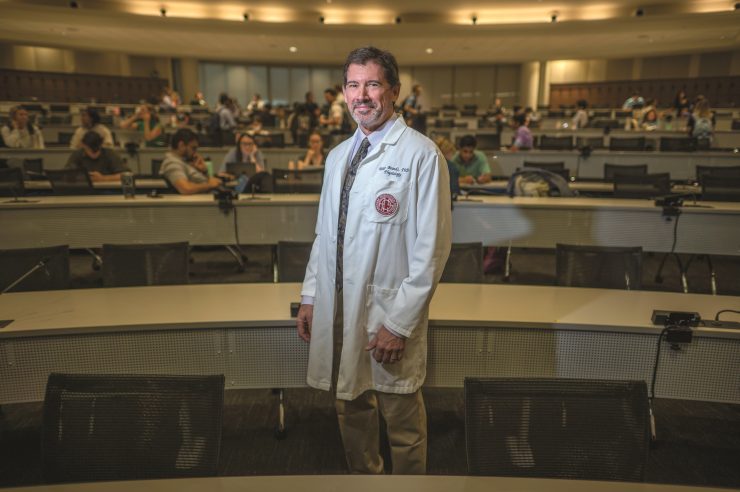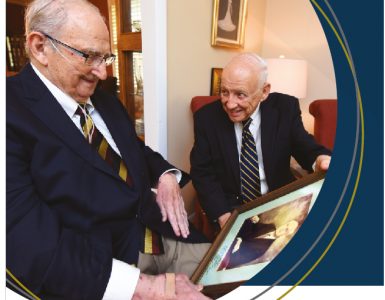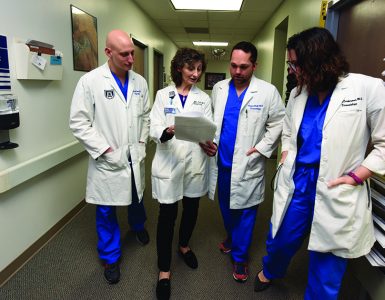Four growing educational initiatives are broadening the statewide impact of Georgia’s only public medical school — proving the Medical College of Georgia is the Medical College for Georgia.
Probably the most visible, with much support from philanthropy and state funding, is the Peach State Scholars Program, which allows students to complete medical school in three years and enter directly into a primary care residency in Georgia, followed by at least two years of practice in a rural and underserved area of that state. The first cohort will graduate this May, with a progression of talented scholars following right behind in the next classes.
Another developing program has a similar goal. AIM, the brainchild of Kelli Braun, MD, ’04, our associate dean for admissions, recognizes that the rural Georgia counties with the most severe physician shortages often also have limited educational resources. The program will help close that gap by providing a summer educational enrichment program on MCG’s campus that will help more of those students be competitive applicants to MCG and eventually, hopefully, return to practice in their home counties.
Both medical students and physicians in rural Georgia will have the support of another initiative spearheaded by Matt Lyon, MD, ’99, associate dean for experiential learning, who is expanding MCG’s telemedicine programs. The statewide network he has helped grow allows our students to engage with patients at rural health care sites from the first weeks of their medical school training through residency. It also provides a safety net for physicians in rural practice, who have remote, 24/7 access to MCG physicians’ expertise.
The fourth, and most complex initiative, became a clear need when I was appointed vice dean last May, which unfortunately coincided with a lot of unrest from our students, many of whom were unhappy with where they had “matched” for the clinical years of their education. With regional campuses in every corner of our state and a second four-year campus in Athens, Georgia truly is our campus. I was shocked by so much disquiet among our students about clerkship assignment.
The three campuses where over 40% of students from the main campus in Augusta do their clerkship training: Northwest (Rome and Dalton), Southwest (Albany) and Southeast (Savannah and Brunswick), were viewed by students and faculty as “those things out there.” They had become ill-defined entities where some students do their clerkships. Students and faculty seemed to have little knowledge of them, and assignment to a regional campus sometimes seemed to be dreaded rather than embraced as an incredible opportunity.
And although students at those campuses often rave about the experience and are great champions for their campus, we also learned from this year’s Independent Student Analysis that they also felt detached from Augusta.
We should be creating an environment where students at all our campuses and training sites recognize that they are valued MCG students without needing to remind them that we are “One MCG.”
This year, under the leadership of Dr. Greer Falls, assistant dean for student affairs for our second-year students, we reinstated the bus trips to our regional campuses, which had not been planned since 2019 and before the pandemic. It is impossible for the class to be positive, even excited, about the regional campus locations without having the opportunity to see them. Staff and faculty worked overtime to make bus trips a reality. Every student in the Class of 2026 visited one of the three regional campus locations during fall 2022. Not only did a third of the class visit each location, but 68 students, ambassadors for each regional campus, were able to share their experience there with their classmates. We also invited regional campus leadership to freshman orientation and held virtual follow-up meetings in February to help students with their clerkship site selection.
While all of this helps students make informed decisions about their choice of sites for clerkships, we also had to address the detachment that some Augusta students felt doing clerkships away from Augusta. Our amazing clerkship directors at the main campus in Augusta answered the bell by planning to personally visit each of these regional campuses during their orientation for new students. They will also plan virtual check-ins to answer student questions and provide updates from the main campus, and regional assistant deans for curriculum, in turn, will provide clerkship directors with updates from their campuses.
The statewide educational experience is growing with new partnerships with Federally Qualified Health Centers and Community Health Centers statewide, an effort being spearheaded by Joseph Hobbs, MD, ’74, and Ashley Saucier, MD, ’11. These partnerships are another way to introduce our students to established healthcare systems providing comprehensive primary care access in underserved communities. More new partnerships with rural hospitals, another effort spearheaded by Dr. Lyon, will also see students in clinical rotations at rural hospitals across the state, a particularly valuable experience for our Peach State Scholars.
We must remember that MCG is the Medical College for Georgia, with one statewide campus that serves the entire state by educating future physicians and placing them in the areas that need them the most.










